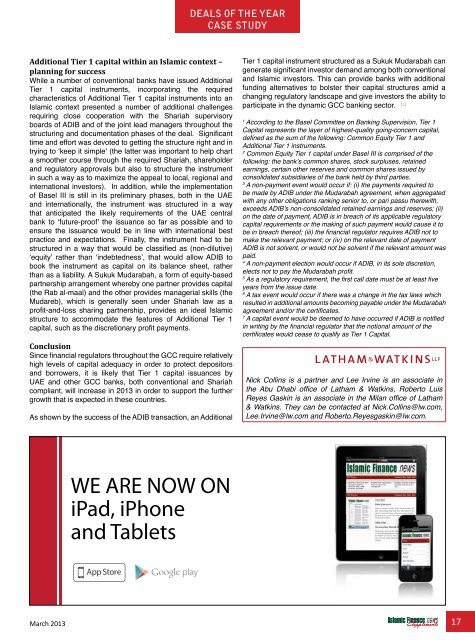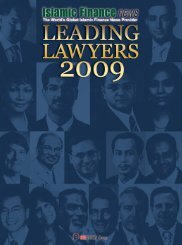View PDF Edition - Islamic Finance News
View PDF Edition - Islamic Finance News
View PDF Edition - Islamic Finance News
You also want an ePaper? Increase the reach of your titles
YUMPU automatically turns print PDFs into web optimized ePapers that Google loves.
deals of the year<br />
case study<br />
Additional Tier 1 capital within an <strong>Islamic</strong> context –<br />
planning for success<br />
While a number of conventional banks have issued Additional<br />
Tier 1 capital instruments, incorporating the required<br />
characteristics of Additional Tier 1 capital instruments into an<br />
<strong>Islamic</strong> context presented a number of additional challenges<br />
requiring close cooperation with the Shariah supervisory<br />
boards of ADIB and of the joint lead managers throughout the<br />
structuring and documentation phases of the deal. Significant<br />
time and effort was devoted to getting the structure right and in<br />
trying to ‘keep it simple’ (the latter was important to help chart<br />
a smoother course through the required Shariah, shareholder<br />
and regulatory approvals but also to structure the instrument<br />
in such a way as to maximize the appeal to local, regional and<br />
international investors). In addition, while the implementation<br />
of Basel III is still in its preliminary phases, both in the UAE<br />
and internationally, the instrument was structured in a way<br />
that anticipated the likely requirements of the UAE central<br />
bank to ‘future-proof’ the issuance so far as possible and to<br />
ensure the issuance would be in line with international best<br />
practice and expectations. Finally, the instrument had to be<br />
structured in a way that would be classified as (non-dilutive)<br />
‘equity’ rather than ‘indebtedness’, that would allow ADIB to<br />
book the instrument as capital on its balance sheet, rather<br />
than as a liability. A Sukuk Mudarabah, a form of equity-based<br />
partnership arrangement whereby one partner provides capital<br />
(the Rab al-maal) and the other provides managerial skills (the<br />
Mudareb), which is generally seen under Shariah law as a<br />
profit-and-loss sharing partnership, provides an ideal <strong>Islamic</strong><br />
structure to accommodate the features of Additional Tier 1<br />
capital, such as the discretionary profit payments.<br />
Conclusion<br />
Since financial regulators throughout the GCC require relatively<br />
high levels of capital adequacy in order to protect depositors<br />
and borrowers, it is likely that Tier 1 capital issuances by<br />
UAE and other GCC banks, both conventional and Shariah<br />
compliant, will increase in 2013 in order to support the further<br />
growth that is expected in these countries.<br />
As shown by the success of the ADIB transaction, an Additional<br />
Tier 1 capital instrument structured as a Sukuk Mudarabah can<br />
generate significant investor demand among both conventional<br />
and <strong>Islamic</strong> investors. This can provide banks with additional<br />
funding alternatives to bolster their capital structures amid a<br />
changing regulatory landscape and give investors the ability to<br />
consulting www.<strong>Islamic</strong><strong>Finance</strong>Consulting.com<br />
www.<strong>Islamic</strong><strong>Finance</strong>Events.com<br />
participate in the dynamic GCC banking sector.<br />
www.<strong>Islamic</strong><strong>Finance</strong><strong>News</strong>.com<br />
www.<strong>Islamic</strong><strong>Finance</strong>Training.com<br />
www.MIFforum.com<br />
www.MIFmonthly.com<br />
www.MIFtraining.com<br />
www.REDmoneyBooks.com<br />
1<br />
According to the Basel Committee on Banking Supervision, Tier 1<br />
Capital represents the layer of highest-quality going-concern capital,<br />
defined as the sum of the following: Common Equity Tier 1 and<br />
Additional Tier 1 instruments.<br />
2<br />
Common Equity Tier 1 capital under Basel III is comprised of the<br />
following: the bank’s common shares, stock surpluses, retained<br />
earnings, certain other reserves and common shares issued by<br />
consolidated subsidiaries of the bank held by third parties.<br />
3<br />
A non-payment event would occur if: (i) the payments required to<br />
be made by ADIB under the Mudarabah agreement, when aggregated<br />
with any other obligations ranking senior to, or pari passu therewith,<br />
exceeds ADIB’s non-consolidated retained earnings and reserves; (ii)<br />
on the date of payment, ADIB is in breach of its applicable regulatory<br />
capital requirements or the making of such payment would cause it to<br />
be in breach thereof; (iii) the financial regulator requires ADIB not to<br />
make the relevant payment; or (iv) on the relevant date of payment<br />
ADIB is not solvent, or would not be solvent if the relevant amount was<br />
paid.<br />
4<br />
A non-payment election would occur if ADIB, in its sole discretion,<br />
elects not to pay the Mudarabah profit.<br />
5<br />
As a regulatory requirement, the first call date must be at least five<br />
years from the issue date.<br />
6<br />
A tax event would occur if there was a change in the tax laws which<br />
resulted in additional amounts becoming payable under the Mudarabah<br />
agreement and/or the certificates.<br />
7<br />
A capital event would be deemed to have occurred if ADIB is notified<br />
in writing by the financial regulator that the notional amount of the<br />
certificates would cease to qualify as Tier 1 Capital.<br />
Nick Collins is a partner and Lee Irvine is an associate in<br />
the Abu Dhabi office of Latham & Watkins, Roberto Luis<br />
Reyes Gaskin is an associate in the Milan office of Latham<br />
& Watkins. They can be contacted at Nick.Collins@lw.com,<br />
Lee.Irvine@lw.com and Roberto.Reyesgaskin@lw.com.<br />
WE ARE NOW ON<br />
iPad, iPhone<br />
and Tablets<br />
March 2013 17
















